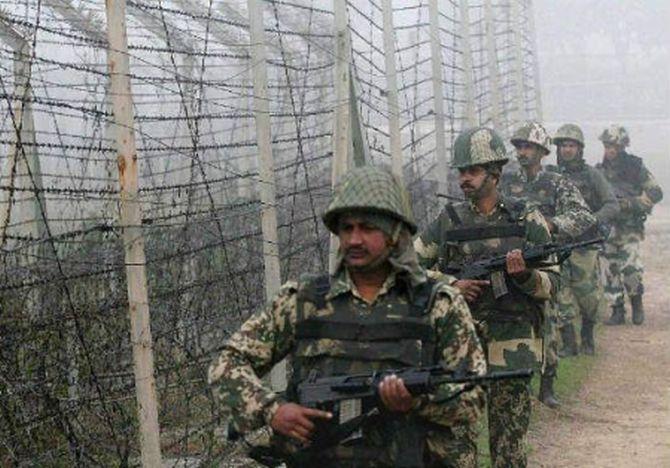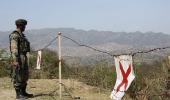'As India progresses and takes an increasingly hardline approach to Pakistani hostility, the young and restless population of Pakistan, sooner than later, will demand Gazwa e Hind (conquest of India),' warns Colonel Anil A Athale (retd).

For someone born on the cusp of Indian Independence and in the evening of one's life, the prospects of peace between India and Pakistan is a legitimate aspiration for the people of that generation.
Recently, a prominent Pakistani lobbyist in the US, of similar vintage, asked this same question of me. Unfortunately, the answer to this is question is negative.
In the foreseeable future there is no chance for peace between the two countries. This brief essay is an attempt to explain why the logic of why this is likely to be so.
The first and the foremost reason is the military domination of the politics of Pakistan.
Even the most ardent and patriotic Pakistani will agree that their politics, policies towards India, Afghanistan, US and China are under firm control of the military.
The Pakistani military has successfully sold the canard that there is constant threat to Pakistani security from India. This is a lie.
With its conventional forces half of India's size and with stockpile of modern American and Chinese weapons, Pakistani armed forces are very capable of defending themselves against a conventional attack by India.
In addition, the nuclear dimension means that even the Indian conventional threat is of a limited nature so as to not trigger a nuclear war.
Keeping the bogey of the Indian threat alive is necessary for the Pakistani army so that it can maintain its iron grip over the country's politics.
Countries do not go to war just because they have the armies; every war is fought for political aims.
India can achieve no conceivable objective by going to war with Pakistan.
Modern history tells us that it is virtually impossible to rule a country that has a hostile population.
Conquest of Pakistan serves no interest of India. But it has to be accepted that anti-Pakistan rhetoric is quite common in India, with overt threats of use of force.
The simple reason for this is that knowing fully well that Pakistan does not pose any viable security threat to India, the rhetoric is a no risk political gambit to show off for politicians. It fetches votes in India.
Domination of the army in Pakistan is not the only reason for hostile relations between the two countries.
Even if the Pakistani army was to turn the corner and put the welfare of its people above its institutional interests, peace will elude Pakistan.
Demography is destiny.
Like geography, it influences politics, economics and issues of war and peace.
Though demography (population numbers, composition and density) is not permanent and certainly changes, yet the rate of change is very slow and there is a certain inevitability about its effect.
Pakistan is a classic case where the demography of the country in combination with its geography makes a combustible mixture that has the potential to blow up the region in mid-term future.
So how many Pakistanis are there?
The true answer will be only be known this year after the result of the current census are out. It is the first census being carried out in Pakistan after 19 years.
As per the last census in Pakistan -- conducted in 1998 -- its population was 130 million. The next census was due in 2008, but was never carried out due to opposition from various quarters.
Even the present census is being undertaken with the help of the Pakistani army. Nearly 200,000 soldiers have been deployed for this task.
Census figures are crucial since the distribution of resources as well as seats in the federal parliament will be decided based on the numbers.
Provinces other than Punjab accuse the dominant province of over counting itself and undercounting the rest, particularly Sindh.
Then there is the problem of large number of Afghan refugees settled in Baluchistan and Karachi.
The Baluchis fear that the census will show that they have become a minority in their own province.
One should expect great internal turbulence once the results of the current census are out.
Irrespective of the internal effect, the population explosion on India's doorstep bodes ill for the region.
The demand for lebensraum in in the East (India) is waiting to happen.
Various agencies of the United Nations have been monitoring the population of Pakistan based on sample surveys. Some of the findings are that by 2025, in less than a decade's time, Pakistan's projected population is expected to touch 210 million.
Already, over 40 percent of the population live officially under the poverty line. This comes to almost 72 million abjectly poor and desperate individuals.
Add to this the fact that over 65 percent of the population is under 25 with barely 16 percent being literate.
The explosive impact of the simmering rage of the young and the disfranchised human bomb becomes fairly clear.
Add another 30 million (we are talking minimum projections here) to this boiling cauldron of social discontent over the next decade and the consequences should not be difficult to fathom.
No wonder, the agitating mobs are getting bigger and bigger in size and turning more violent.
There are simply too many, too angry at being squeezed into a suffocating socio-economic environment, and too young to fear anyone in taking down any system that does not deliver change.
Pakistan has no serious population control programme.
UN statistics also shows that the per woman fertility in Pakistan is 5.2 children. This is in a sense misleading since the middle class is not part of it.
Thus, the really poor and the illiterate are the ones who are adding more than 6 children to the pool of the poverty-stricken multitude.
At this rate of growth of population, Pakistan in a decade will become the world's third most populous country after India and China, overtaking the US.
With a meagre fertile landmass, no minerals, rudimentary industry, Pakistan is destined to implode.
Far from developing, Pakistan may also not be able to exist in its present physical form unless it makes a serious commitment towards population control.
Pakistan is unable to provide resources to its present population, let alone cater for the coming human waves. Whatever development plans are made by whoever are laid asunder by population.
Historically, Europe also saw this kind of population growth in the 16th and 17th century. But those were the days of fluid national boundaries and colonialism.
The European hordes decimated the populations of America and Australia and usurped the resources of Africa to get over this crisis.
This luxury is not available in the 21st century.
In some ways, a similar situation exists in India as well. Our northern states have similarly high human fertility rates. But the south and west of India, that has reached demographic stability, provides an outlet for the surplus population of the north.
The north to south labour movement has been noted in Indian census reports. For some years, the Gulf boom provided a similar outlet for the Pakistani population. But with a dramatic fall in oil prices, the Gulf boom is over.
The restive population of Pakistan is being kept under control by the ruling elites with the help of religious mobilisation.
'Jihad' is not merely a religious concept in Pakistan, but an avenue of employment.
To keep the fires of jihad burning is thus a political necessity.
A permanent state of enmity with India is thus a necessary precondition for keeping the country together and also keep resources flowing to the military.
As India progresses and takes an increasingly hardline approach to Pakistani hostility, the young and restless population of Pakistan, sooner than later, will demand Gazwa e Hind (conquest of India).
A beleaguered Pakistani government and the military will then be forced to adopt the path of a military adventure.
The Pakistani womb bomb is deadlier than its nuclear bomb and its chain reaction is unstoppable.
India would do well to take into account the challenge posed by the demographic implosion in Pakistan that has the potential to trigger nuclear explosions in the subcontinent.
Colonel Anil A Athale (retd) is a military historian and coordinator of the Pune-based think-tank Inpad.
IMAGE: Indian soldiers near the border with Pakistan.










